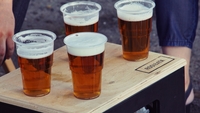Independent Guide to Care in North Wales
- Home
- Add Listing Care Homes
- Care Homes in Anglesey
- Care Homes in Conwy
- Care Homes in Denbighshire
- Care Homes in Flintshire
- Care Homes in Gwynedd
- Care Homes in Wrexham
- EMI - EMH Care Home Care
- Home Care in Anglesey
- Home Care in Conwy
- Home Care in Denbighshire
- Home Care in Flintshire
- Home Care in Gwynedd
- Home Care in Wrexham
- Other Products and Services
- Products and Services
- Rehab Services
- Links
- Blog
Quick Search
 For some, drinking alcohol can be enjoyed as part of a special occasion, but like a lot of substances, some can become addicted to it both psychologically and physically. The NHS has estimated that in the UK, around 9% of men and 3% of women have signs of alcohol dependency. What they mean is that, at some point in their lives, alcohol becomes a very important factor or the most important factor, and they believe they cannot function without it. Some may require alcohol rehab. What is alcohol dependence? Alcohol dependence is also known as alcoholism, and it is the most serious and worrying form of alcohol misuse. It is an uncontrollable and strong desire to constantly drink. What causes alcohol dependence? Usually, there are several different factors taken into consideration when diagnosing an alcohol addiction. One factor is looking into the family. Alcohol-related issues can actually run in families, and be passed down through your genes. This is also massively influenced by the families attitude towards alcohol. Your environment growing up can have a huge impact. Stressful events in your life, such as losing a loved one, or losing a job can be a trigger which causes drinking problems. A lot of people who suffer from alcohol misuse have a higher chance of suffering from other mental health issues like depression, anxiety, post-traumatic stress disorder, and psychosis. They may also end up taking other substances and drinking to reduce the symptoms of these mental health issues. However, in the long term, drinking will only make these things feel worse due to adding to the chemical imbalance in the brain. What are the signs of alcohol dependency? If you are beginning to worry about how much you or one of your loved ones is drinking then there are some warning signs which you can look out for. Are you/they always thinking or worrying about where you will get your next drink? Are you planning other things such as family events and work meetings around alcohol instead of the other way round? Are you drinking to mask feelng of depression and anxiety? Are you still drinking despite your family members asking you not to?
If you answered yes to any of these, then you should consider asking for help.
|
Archives
September 2023
August 2023
July 2023
June 2023
May 2023
March 2023
February 2023
December 2022
November 2022
August 2022
July 2022
May 2022
April 2022
September 2021
December 2020
November 2020
October 2020
September 2020
May 2020
May 2018
September 2017
August 2017
June 2017
May 2017
March 2017
January 2017
September 2016
April 2016
March 2016
September 2015
June 2015
September 2014
February 2014
December 2013
August 2013
October 2012
June 2012
Other Sites In The "North West and Wales" Network
North Wales Online Community
Chartered Accountants North West and Wales

